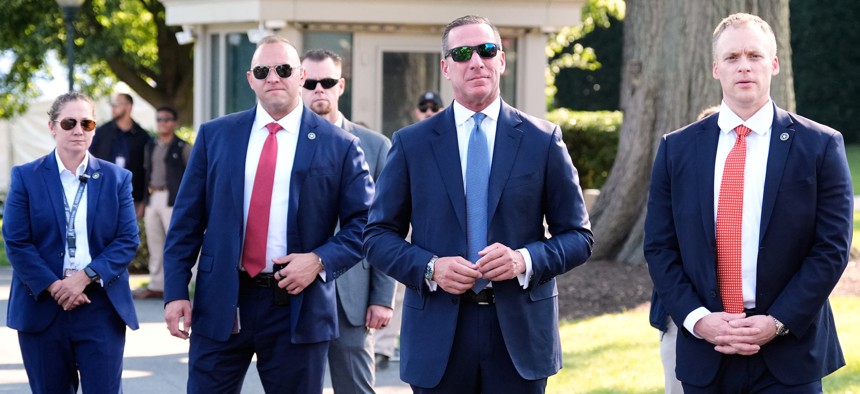
U.S. Secret Service Director Sean Curran, second from right, looks on during a Fourth of July celebration at the White House. He said that the agency has taken "many steps to ensure" that events like the near assassination of President Donald Trump don't happen again. ALEX BRANDON / GETTY IMAGES
Secret Service commits to continued improvements one year after Trump assassination attempt
The protective agency also received $1.2 billion, in part for recruitment and retention, from the One Big Beautiful Bill Act.
One year after a gunman nearly assassinated Donald Trump, killed a campaign rally attendee and injured two others, the U.S. Secret Service finds itself with more applicants, more money and a growing to-do list of recommended operational reforms.
The USSS on July 10 reported that, of the 46 congressional recommendations made in the wake of the shooting, it has implemented 21 of them, 16 are in progress and nine are under the jurisdiction of other governmental entities.
“I have kept my experience on July 13 top of mind, and the agency has taken many steps to ensure such an event can never be repeated in the future,” said Sean Curran, Trump’s former lead agent who he tapped to be USSS director, in a statement. “Nothing is more important to the Secret Service than the safety and security of our protectees. As director, I am committed to ensuring our agency is fully equipped, resourced and aligned to carry out our important mission each and every day.”
Several of the improvements deal with ensuring proper communication between federal, state and local law enforcement officers who are securing events. Poor coordination at Trump’s Butler, Pennsylvania, rally among security personnel from different agencies has been flagged as an issue that contributed to the assassination attempt.
USSS said that it is still working toward providing more standardized and periodic training to protective agents, but officials noted that they have revised curriculum for site security responsibilities. Watchdogs for years have identified inadequate training time as a problem for the agency.
On July 10, USSS also said that it had taken disciplinary action against six employees in relation to last year’s shooting, with punishments ranging from 10- to 42-day suspensions without pay and placements on restricted duty or into non-operational positions.
The Government Accountability Office on July 12 issued a report on the assassination attempt that included eight recommendations. USSS concurred with all of them.
GAO suggested, for example, that the agency develop a process to make sure that “actionable threat information” is shared with officials who are creating the security plan for an event. USSS responded that it is undergoing a review to update guidance on the matter and has already made some changes to associated procedures.
For fiscal 2026, USSS requested roughly $3.5 billion, which is nearly $192 million more than it received for the current fiscal year. That amount will support about 8,800 positions, which is 444 more than the present authorized total.
In its budget overview, the agency emphasized that in the coming years it will help secure the U.S.-hosted 2026 World Cup and 2028 Summer Olympics.
USSS already has received a nearly $1.2 billion infusion through the One Big Beautiful Bill Act (H.R. 1), which Trump signed into law on July 4. The funding, which is available through Sept. 30, 2029, can be used by the agency for additional resources as well as performance, retention and signing bonuses.
Performance bonuses are at the director’s discretion, retention can go to an employee who commits to an additional two years of service and recipients of signing pay must work for five years at the agency.
Following a recruitment campaign that included a Super Bowl ad, the Homeland Security Department in May reported an uptick in USSS applications. Specifically, officials said more than 22,000 individuals applied between Jan. 20 and May 1 compared with 7,000 during the same period in 2024.
USSS did not immediately respond to a request for comment on what percentage of applicants historically have completed the hiring process.
While the agency pointed to staffing shortages after the assassination attempt against Trump, officials reviewing the incident generally did not include workforce size as a major factor in the security failure.
Share your news tips with us:
Sean Michael Newhouse: snewhouse@govexec.com, Signal: seanthenewsboy.45
NEXT STORY: Social Security signals potential benefit disruptions this fall for those still getting paper checks







